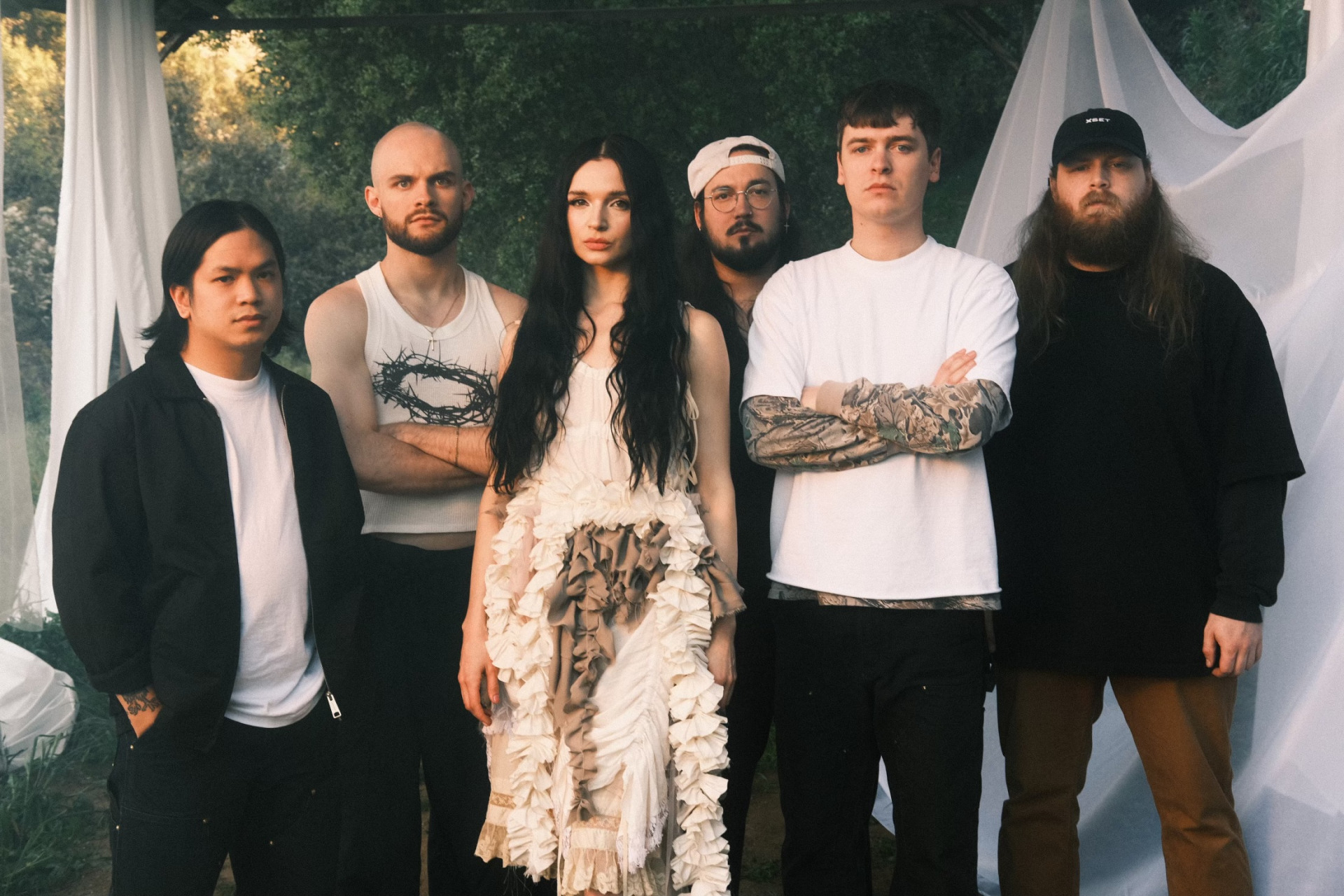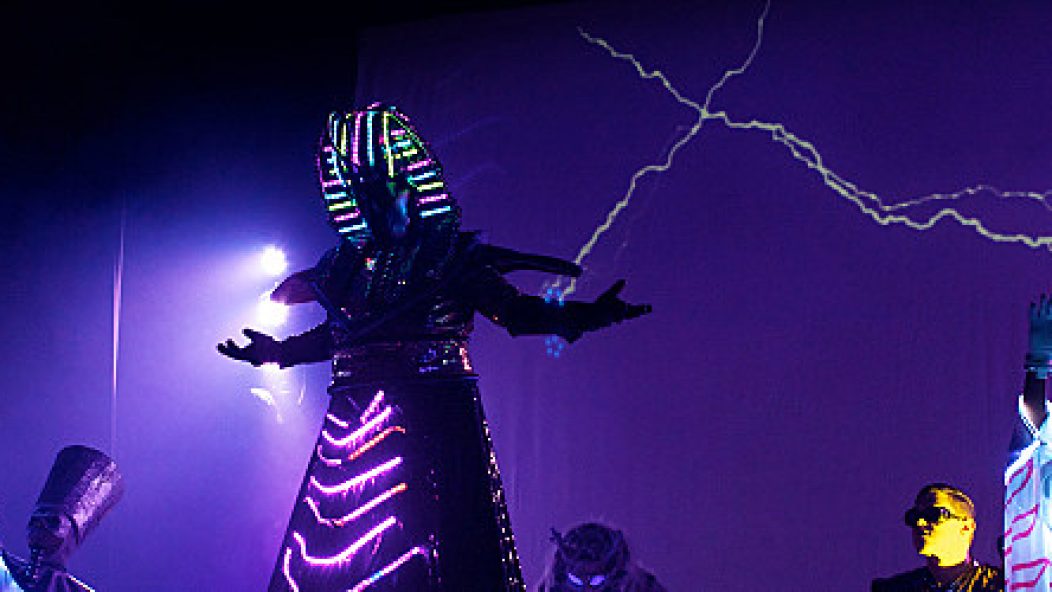
Electric Pharaoh - A Musical Theater Review
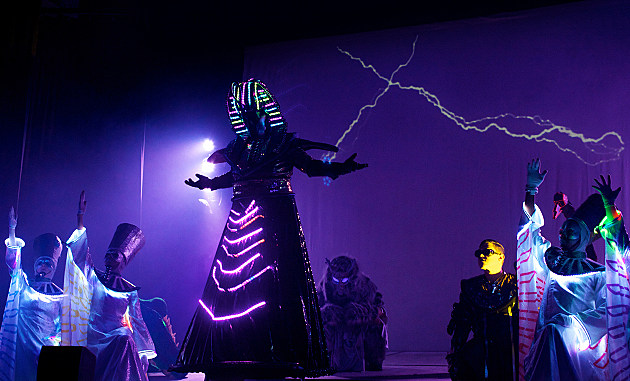
…
The doorman notices my shirt as we walk up to him. “Most people don’t know that band,” he says as he punches my ticket, “but you’ll find a few here who do.”
The band in question is Manilla Road. The ticket in question is for the Baltimore Rock Opera Society‘s original rock opera, The Electric Pharaoh. I’ve never been to one of their shows. I have no idea what to expect. I’ve done the local theater thing before, and it was all miss, no hit.
But apparently the BROS folks know what Manilla Road is. Somehow, this tenuous connection eases my concerns.
The pictures on BROS’ website were what originally sold me on Electric Pharaoh. I figured that if the rest of the production was half as good as the costumes, it was going to be really good. It was.
Rock operas aren’t typical in heavy metal music, even though people often forget that Queen was once a proto-metal act (circa “March of the Black Queen”). Sometimes metal comes close to rock opera (Queensryhce – Operation Mindcrime) and some rock operas dabble in metallic heaviness (Meat Loaf – Bat out of Hell). Still, both metal bands and rock operas often traffic in the same brands of darkness and melodrama. Electric Pharaoh registers on the metal-meter based on its storyline alone.
I should note here that there are minor spoilers below.
Electric Pharaoh takes place in a world where the clouds are so thick that the sun no longer shines. To the populace, it’s a myth, but the Pharaoh and her close associates know better. The gap between rich and poor grows ever wider, and Pharaoh’s guards repress the common folk with arrests and physical violence. Electricity, referred to colloquially as “volts,” is both currency and life. Citizens wear a talisman on their arm which is effectively their wallet, as it displays their accumulated volts or lack thereof. Citizens who lack volts are called “dimmers” and are treated as second-class citizens at best. Meanwhile, all food production occurs indoors, the precious volts powering lights to nourish the food plants.
And lately, the volts have become more and more scarce. No one knows why. Pharaoh makes the volts, so is she weakening? Why have there been random discharges of electricity in the dimmer slums on the outskirts of the capital city?
We’re introduced to Electric Pharaoh‘s world via the grandeur of the Cascade, a celebration and demonstration of Pharaoh’s literal power to provide life via her volts. We experience the Cascade much as Pharaoh intends for her citizens to: an overwhelming display of electricity, wealth, and spectacle. Dancers in animal costumes and ancient Egyptian-themed robes whirl about the stage. The music is thunderous, and the costuming amps up the grandeur.
…
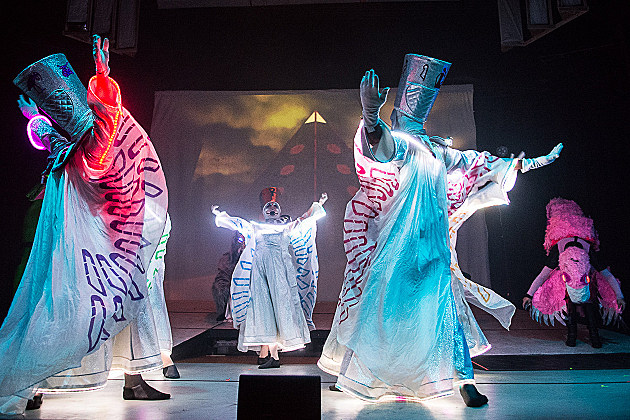
…
I could go on forever about the costumes, which are every bit as good as they look on BROS’ website. They are intricate things, festooned with LEDs. The troupe of female dancers in Egyptian robes are called Scarabels, and they take on an ethereal, otherworldly beauty when the house lights come down. Pharaoh’s soldiers wear a snake-like helmet and an armored carapace lit with blue LEDs, making them look robotic and implacable. Pharaoh’s headdress is a technicolor work of art and suitable for a person of her importance.
The costumes aren’t the only great part of the production, though. Everything about The Electric Pharaoh is professional quality, despite being put on as a hobby by dozens of people. The major roles require singing, and BROS somehow managed to find people good enough to front bands while being quality actors. The choreography and dancing is superb, and well coordinated with the costumes to bring the characters to life. The music is a mix of rock and electronic, and there’s a bandcamp link below with most of the songs available. (Sadly, a hilarious Showtime-style tune about torture didn’t make the bandcamp link.)
The actors stand in front of a screen upon which CG graphics are displayed. Sound effects are coordinated with the action on-stage, such as the electrical discharge effect that sounds when Pharaoh’s soldiers use their staves. When Pharaoh speaks, her voice is distorted to sound godlike and cybernetic. Listen to Meshuggah’s “Mind’s Mirrors” from Catch ThirtyThree, starting at around 32 seconds in, to hear what Pharaoh sounds like.
The writing and dialogue also deserve praise. Like all good sci-fi, Electric Pharaoh communicates something other than just the story. It relates back to our reality, and it speaks to adherents of any common political persuasion. Liberals and progressives will see a cautionary tale about what happens when our world becomes too polluted, too overcrowded, and too resource poor. About what happens when the gap between rich and poor becomes a chasm and when religion is justification for dystopia. Conservatives and libertarians will see it as a story about a government gone amok, abusing a disarmed populace while hiding the truth with careful lies, propaganda, and technology.
While the dialogue and concept is smart, it’s not too highbrow. The writers and choreographers gave the play a sense of humor via some X-rated jokes. The aforementioned screen and graphics are sometimes projected in “6-D”, so the audience has to wear the six-dimensional viewing glasses supplied at the beginning of the play. In other words, fun is not sacrificed for heavy handed moralizing.
…
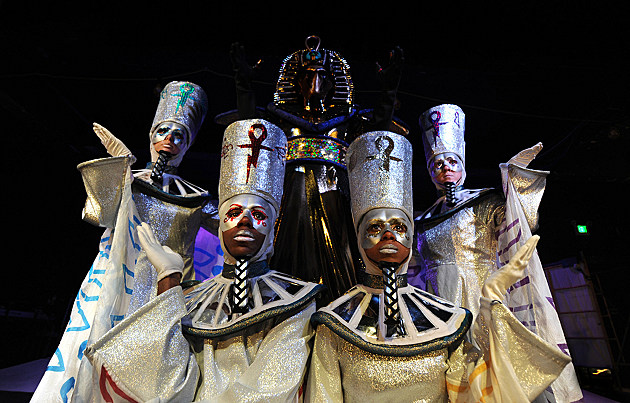
…
At the time this post runs, it’s too late to see The Electric Pharaoh in any city except for Philadelphia; showings in Baltimore and D.C. are over, so I’m sorry about that. If you live in or close to Philly, I’m sorry about that too, but you should try and see the production, which is showing on November 14th, 15th, and 16th at Plays and Players Theater. For $20, it’s way more and way better than whatever crappy local bands that will be stinking up your favorite club. It’s not strictly metal, but it is over-the-top—even better, it’s a hell of a lot of fun. The sense of drama and the epic tone will appeal to other metal fans. I saw a few in the audience: a high school friend who’s into power metal, a dude with a Taake backpatch on his denim sleeveless, and even a dude wearing an Into Another shirt. I’m not much for musicals, but Electric Pharaoh is the blueprint for a play with singing that appeals to metalheads without actually possessing a metal soundtrack. Spend the $20 and the hour and a half of your life—you won’t be disappointed.
…
…









